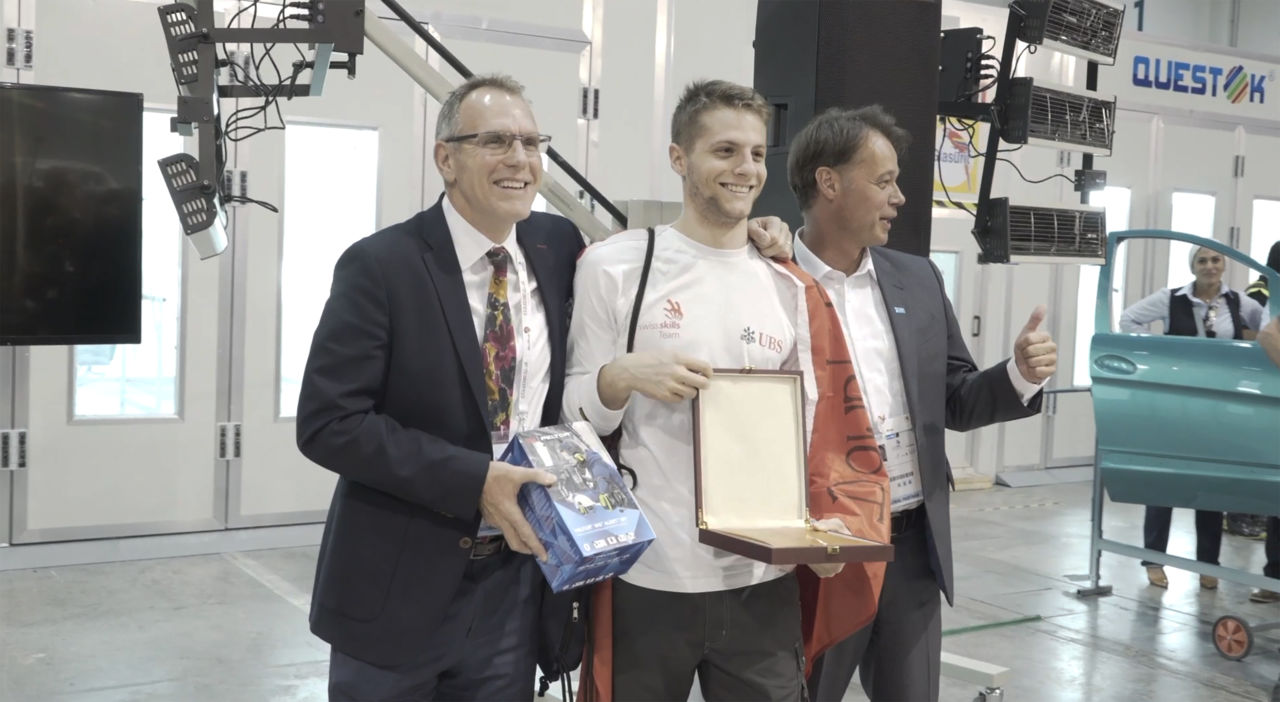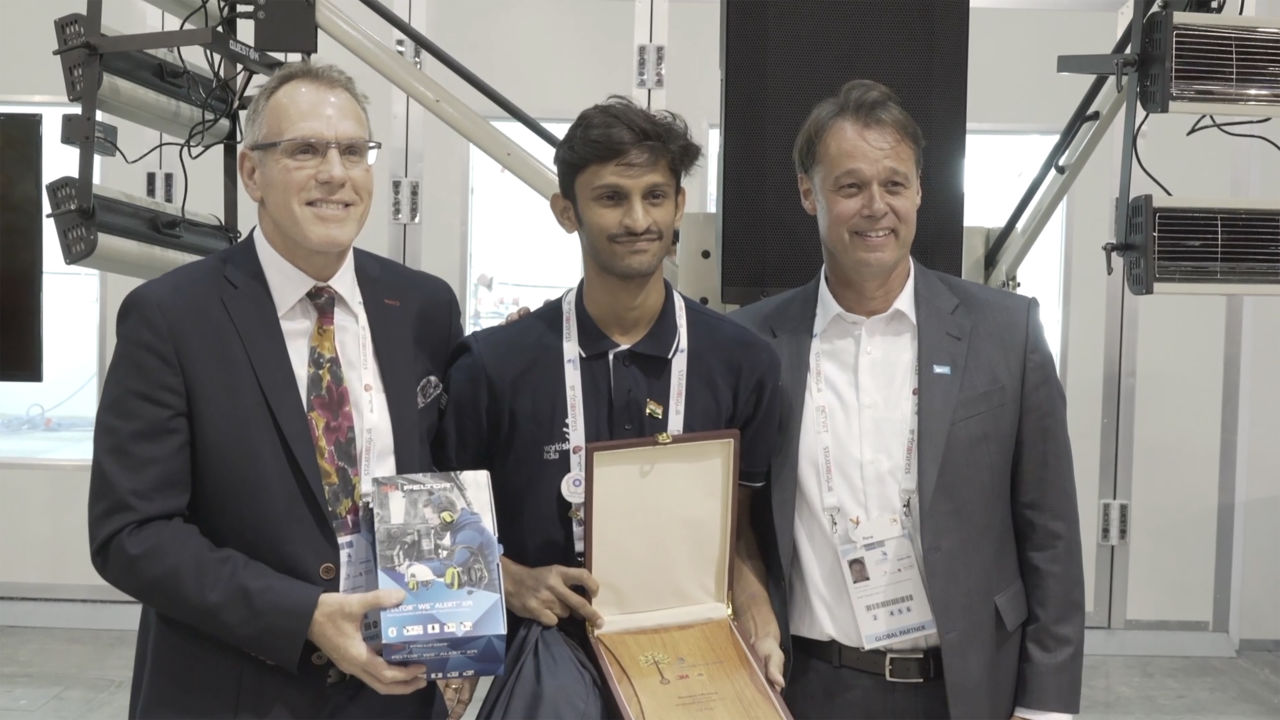12 January 2018
Painting a picture of how Skills can embrace sustainability

Auto-artists whose car painting abilities combine style and sustainability are the first to be given the chance to shine through an initiative launched at WorldSkills Abu Dhabi 2017 - the largest global showcase of vocational skills excellence – and set to be expanded in order to help build the workforces of the future.
Inspired by the BASF Best Painter competition, the Sustainability Practice Award was a pilot initiative unveiled in the Car Painting skill competition at the recently held 44th edition of the world championship of vocational skills, where Competitors were required to display efficiency as well as excellence.

The initiative – designed to raise awareness of sustainability, with a specific focus on the car painting industry – challenges participants to make careful use of resources and produce less waste when completing their Test Project in the Competition. Based on its outcome, WorldSkills plans to implement the Award in other skills competitions, as part of its mission to nurture skilled young people who are equipped to support and shape modern, forward-thinking, and sustainable industries.
The goal of the project was to integrate the tangible demonstration of sustainable practice – namely resource efficiency - by Competitors into the official scoring of their performance, making it a central aspect of the WorldSkills Competition. It is designed to enhance WorldSkills sustainability credentials by encouraging the use of such practices from the bottom up, in each skill competition, and to cultivate ‘green’ mindsets among Experts and Competitors.
Following the piloting of the inaugural award at WorldSkills Abu Dhabi 2017, the average amount of waste produced in Car Painting has become a baseline for assessing the future performance of Competitors, meaning they will set a WorldSkills Standard when they use less resources and produce less waste than this baseline states.
Jens Søndergaard Hansen, the Deputy Chief Expert of Car Painting for WorldSkills said, “Sustainability suits this skill very well, and suits our industry even better, because whatever we do can create some pollution due to the amount of cars you have around the world.”
“Every day, cars will be involved in accidents and need to be repaired. Performing those repairs can be done in a way that is good for the environment if care is taken, and very bad for the environment if it is not.”

Judges tested Competitors on many aspects, including their proficiency in quantitatively measuring and controlling the amount of clear coat removed when sanding and buffing automotive paints, and the amount of masking waste, base coats, and sanding they used.
The three winning Competitors for the first Sustainable Practice Award were Maurus von Holzen, Switzerland, who achieved first place, followed by Enzo Barragato, France in second place, and Shahad Shahida Manzil, India who won third place.
An award presentation within the Car Painting workshop was held on the last day of WorldSkills Abu Dhabi 2017. WorldSkills Global Partners 3M and Glasurit helped support and endorse the project.
“This initiative has raised a lot of good ideas,” said Mr Hansen. “There is now a new marking system that enables people to perform better than the industrial standard.”
“For example, if you carry out repairs in the factory, that is industrial standard, but you do them with a limited amount of products and energy, we call this the WorldSkills Standard. It is about reducing the waste from products and introducing this into the marking system of the WorldSkills Competition.”
“If you go to a body shop, the best car painter will be the one who can do the job perfectly, but also at the lowest cost. The more precise a car painter is, the better they are.”
Mr Hansen pointed to the fact that the winner of the Sustainability Practice Award also scored “very well” in the overall WorldSkills Competition, indicating a correlation between sustainability and excellence. “It shows that if you have a good overview of your area and have trained a lot, sustainability becomes an integral part of your skill and you become more precise at what you do,” he said. “Sustainability is very easy to measure, and everybody found it a very good idea.
“WorldSkills is a catwalk of how to educate young people. If we start this sustainability lesson and Competitors integrate that into their work, it will be well-supported throughout industry as well.”
The Sustainability Practice Award is an initiative that Mr Hansen says he would now like to see being rolled out across all other skills competitions under the WorldSkills umbrella. “I cannot think of one skill where this would not be relevant,” he said.
“In the electrical skills, you can measure the amount of electricity used. In the cookery skill, you can measure food waste. Across all skills, it makes sense, because sustainability is a big and important issue within all industries.”
“As for Competitors themselves, it illustrates skill, it demonstrates talent, and it shows that you know your skill very well. It’s very important for the sustainability aspect to be incorporated.”
Rodney Bolton, Chief Expert of Car Painting, praised the efforts of Competitors for embracing sustainability during WorldSkills Abu Dhabi 2017.
"At the request of WorldSkills we were asked to be a pilot programme for sustainable practices during our competition in Abu Dhabi and bring sustainability directly to the Competitors as an integral part of Car Painting,” he said. "This seemed like a natural transition to continue the goal that we established for our competition, which was to make car painting remain sustainable. This would advance our goal and at the same time bring sustainable practices to the forefront of the event.”
"I believe that all of the Competitors made a great attempt to conserve materials and supported the goal of sustainability. Not only will sustainability reduce the carbon footprint per competitor it will also allow us to bring in more countries to participate in the competition.”
Mr Bolton said he believed that sustainability should be a valued part of most skills within the competitions.
"It not only reduces the burden on the sponsors that supply the materials and equipment,” he said. “But it also important, at this level, that we project the importance of sustainability to the Competitors and in essence to the world."